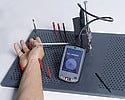Student-Designed Device Could Strengthen Hand Testing
September 1, 2009
R&D DIGEST
|
The Peg Restrained Intrinsic Muscle Evaluator (PRIME) enables more-accurate hand strength evaluation than methods that are currently available. (Image courtesy of Rice University.) |
A senior project completed by undergraduates at Rice University (Houston, TX) has earned them much more than a degree. Motivated by a challenge issued by an orthopedic hand surgeon, a group of bioengineering students has invented a device to measure intrinsic hand muscle strength.
According to Shuai Xu, coinventer of the device, hand strength is generally evaluated by having patients hold up a hand and push in different directions. This type of assessment, which is based on feel, lacks repeatability and fails to adjust for small hands or unique morphologies, Xu says.
Hoping to give physicians a more useful tool, the student team created the Peg Restrained Intrinsic Muscle Evaluator (PRIME). The device consists of a pegboard restraint, a force transducer enclosure, and a PDA custom-programmed to capture measurements, says a university press release.
Using PRIME, a doctor can test a patients' hands in five minutes. The pegs are used to isolate a patient's fingers, and a loop that is fitted around the fingers measures the amount of force that is generated when a patient moves it.
Xu says PRIME could help hospitals and rehabilitation clinics compare the effectiveness of surgical interventions and diagnose neuromuscular degenerative diseases. Neuromuscular disorders such as spinal cord injuries, Lou Gehrig's disease, diabetes, and multiple sclerosis all affect the intrinsic hand muscles, Xu says.
Rice graduates Caterina Kaffes, Matthew Miller, and Neel Shah are the coinventors of PRIME. The student group won first place and $10,000 at Ishow, an innovation competition in Palm Springs, CA, that was sponsored by the American Society of Mechanical Engineers. They were also one of five winners of a contest at the Rehabilitation Engineering and Assistive Technology Society of North America conference that was sponsored by the National Science Foundation.
The students have a patent pending for PRIME. The device is currently being validated at the Texas Medical Center Institution.
Copyright ©2009 Medical Device & Diagnostic Industry
About the Author(s)
You May Also Like


.png?width=300&auto=webp&quality=80&disable=upscale)
